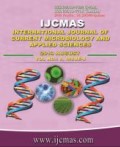


 National Academy of Agricultural Sciences (NAAS)
National Academy of Agricultural Sciences (NAAS)

|
PRINT ISSN : 2319-7692
Online ISSN : 2319-7706 Issues : 12 per year Publisher : Excellent Publishers Email : editorijcmas@gmail.com / submit@ijcmas.com Editor-in-chief: Dr.M.Prakash Index Copernicus ICV 2018: 95.39 NAAS RATING 2020: 5.38 |
Genetic variability is prerequisite for any crop improvement program as it helps breeders in selecting the superior plants in segregating generations. Genetic variability for yield and its contributing traits in F3 and F4 generations derived from the cross WH 711 / WH 542 was assessed. The 238 F3 and F4 progenies along with parents were characterized on the basis of 12 morpho-physiological traits. The study revealed highly significant difference among the progenies for yield and its contributing traits. The magnitude of phenotypic coefficient of variation (PCV) was slightly higher than their respective genotypic coefficient of variation (GCV) for all the characters in both generations. This indicated the least influence of environment on the characters studied. High estimates of PCV and GCV was noted for 1000 grain weight followed by spike weight, number of tillers per plant and grain yield per plant in F3 generation however in F4 generation, its magnitude was higher for 1000 grain weight followed by number of grains per spike and spike weight suggesting the possibility of improving these traits through selection. High estimates of heritability coupled with high genetic advance as per cent of mean in F3 generation were recorded for spike weight, number of tillers per plant, 1000 grain weight and harvest index. In F4 generation, high estimates of heritability coupled with high genetic advance as per of mean were observed in 1000 grain weight, spike weight, number of grains per spike and grain breath, offered scope for improvement through selection. Therefore, these characters could be improved more easily than the other characters.
 |
 |
 |
 |
 |